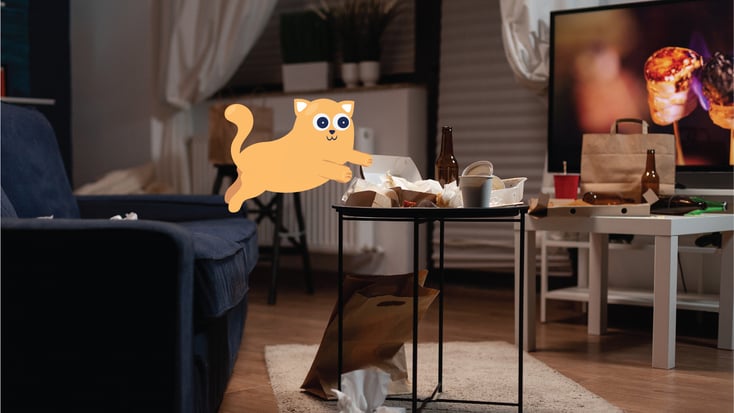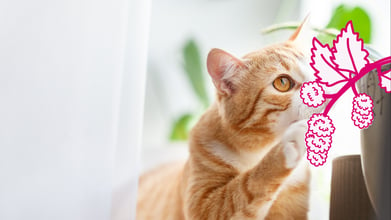Cat Zoomies: Why Do They Get Them?

Discover the fascinating world of cat zoomies! These exciting bursts of energy and playful behavior bring happiness and laughter to cat parents everywhere.
In this blog post, we'll uncover the reasons behind zoomies in cats, their advantages, and practical ways to manage them for a harmonious bond with your feline friend.
Key Takeaways:
- Cat zoomies, or Frenetic Random Activity Periods (FRAPs), are bursts of energy and hyperactive behavior commonly seen in younger cats.
- Regular play sessions and mental/physical stimulation throughout the day can help manage and prevent cat zoomies.
- If your cat's behavior is concerning or unusual, it's advisable to consult with a veterinarian for personalized advice and assistance.
What Are Cat Zoomies?
Cat zoomies, or Frenetic Random Activity Periods (FRAPs), are sudden bursts of energy and hyperactive behavior commonly in younger cats. During zoomies, cats may engage in running, jumping, chasing imaginary prey, and playful antics, bringing excitement and entertainment to their owners.
Why Do Cats Get the Zoomies?
Cats, known for their lengthy naps throughout the day, often find themselves bursting with energy. To effectively burn off this excess energy, they engage in a behavior many cat owners are familiar with: the zoomies. Here are some reasons why cats get the zoomies and how it serves as a beneficial outlet for their abundant energy:
1. They have pent-up energy
Cats, especially kittens and younger cats, have bursts of energy that need to be released. Since they sleep a lot and conserve energy, zoomies serve as a way to burn off excess energy. Indoor cats, in particular, engage in zoomies to compensate for the lack of outdoor hunting.
2. They experience physical discomfort
While less common, cats may exhibit zoomies in response to physical discomfort. Skin allergies, fleas, ticks, or other physical discomforts can make cats run around in an attempt to alleviate the sensations. Teething in kittens can also cause hyperactivity and irritability, especially at night when teething pain can disrupt their sleep.
3. They are hungry
Hunger can make cats restless and trigger zooming behavior. They may dash around the house in search of food, trying to get your attention or expressing their discomfort due to an empty stomach.
4. They just pooped
After using the litter box or pooping outdoors, cats may experience a sense of relief and express it through zoomies. If your cat circles around or appears agitated after pooping, it could indicate discomfort in the rear end or digestive issues.
5. Cats are crepuscular
Cats are naturally crepuscular animals, meaning they are most active during the twilight hours between sundown and sunrise. This increased energy during the night can lead to hyperactivity, and they may be scratching, biting, or destructive.
6. Insufficient exercise
Cats require both mental and physical stimulation. If they don't get enough exercise or mental stimulation during the day, they may have bursts of energy in the evening, resulting in the notorious "night crazies" or zoomies.
7. Separation anxiety
When left alone in the evening, cats may exhibit zooming behavior upon your return. This can be due to excitement upon seeing you again or the release of stress and anxiety they experienced during your absence. Kittens, in particular, have shorter tolerance for being alone compared to adult cats.
If your kitten shows signs of stress or becomes destructive, consult your veterinarian for suggestions on preventing separation anxiety.
How to Stop Cat Zoomies
Incorporating regular play sessions throughout the day is highly beneficial to manage and prevent zoomies effectively. Rather than relying solely on a single long play session in the evening, consider breaking it up into several short five-minute play sessions spread across the day. This approach engages your cat, allowing them to burn off excess energy and stay entertained.
Here are additional strategies to help address the zoomies in your cats:
1. Mental and physical stimulation during the day
Engage your cat in interactive play using toys such as laser pointers, fishing pole toys, and scratching posts. This helps fulfill their natural hunting instincts and keeps them mentally and physically active.
2. Establish a nightly routine
Create a predictable and calm environment during nighttime to help your cat wind down and prepare for sleep.
3. Avoid giving catnip in the evening
Catnip can trigger zoomies in cats, so it's best to avoid offering it before bedtime. However, you may notice a more relaxed state as the effects of catnip wear off.
4. Address anxiety
If your cat experiences separation or other forms of anxiety, consult your veterinarian for techniques and natural calming remedies to help them feel more secure.
Conclusion
If your cat is displaying new behavior that seems strange or concerning to you, it’s always a good idea to schedule a behavioral consultation with your veterinarian. They can provide personalized advice and ensure your cat's well-being.
Embrace the zoomies and cherish the playful moments with your cat while prioritizing their health and happiness!
Frequently Asked Questions
Are cat zoomies good?
Zoomies are a normal and natural behavior for cats. They are generally considered good because they provide an outlet for cats to release pent-up energy and engage in playful behavior. However, it's important to ensure that the zoomies are not causing any harm or destruction.
Related reading: Why Do Cats Knock Things Over?
How long do cat zoomies last?
Cat zoomies typically last from a few minutes to about 15 minutes. Keep in mind, though, that every cat is different, so some might have Zoomies sessions that are longer or more intense.
Why is my cat hyper at night?
Your cat’s hyperactive behaviors are most likely what’s called the “zoomies,” which is usually a harmless way to expend energy before winding down to sleep for a long stretch again.
Why won't my cat let me sleep?
As mentioned above, cats are crepuscular, meaning they have the most energy after dark and before sunrise. This is most likely due to their natural instinct to hunt nocturnal animals like rodents.
Check out our post on the 10 of the Most Interesting Facts About Cats







